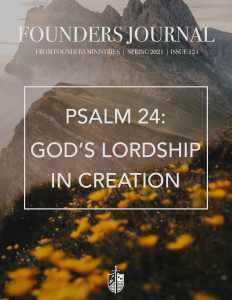The Crucial Question
“Who is God?”—Ask such a question of any group, and you will likely receive a range of responses. A few respondents might reject the validity of the question and simply deny the existence of God. Most, though, will likely offer religiously-tinged answers. “God is all-knowing,” they might say. He is “all-powerful, all-loving.” A few more “all” expressions might then give way to the use of “omni,” like “omnipresent” or even the somewhat cumbersome “omnibenevolent.” Finally, the “alls” and the “omnis” may crescendo into an assertion of God’s perfection. What often gets lost in the course of the ensuing conversation is that stacking up thesephilosophical adjectives misses the point of the question.
Consider possible responses to “Who is the President of the United States?” Should someone answer with the words “important” and “well-dressed,” it is doubtful that the respondent actually knows much about the American presidency. In addition, despite the fact that these words accurately characterize whomever may hold that office in a general sense, it is safe to assume that the person who speaks this way and the sitting President are not mutually acquainted. Similarly, philosophical answers to the question “Who is God?” not only initially cast doubt upon whether the respondent knows of God, but also in the end upon whether the respondent actually knows God at all.
So, back to the question: “Who is God?”—or, as the psalmist puts it: “Who is this King of glory?”
The Creator-King
1 The earth is the Lord’s and the fullness thereof, the world and those who dwell therein, 2 for he has founded it upon the seas and established it upon the rivers.
Creation theology includes a number of “givens” that many in atheistically- and scientifically-minded Western cultures find nearly impossible to accept. Among these “givens” is the unmediated, direct action of God in the creation of the world. Contrastingly, in Scripture God’s direct agency in creation is never in any doubt. God created on a grand scale; his “let there be lights in the expanse of the heavens . . .” speech act (Gen 1:14–16) ignited untold trillions of fusion reactions so that stars would blaze their heat and light throughout the universe. God also created on an intensely intimate scale; he fashioned the first man from dust and the first woman from that man (Gen 2:7 and 22). These acts are “givens” behind poetic allusion to the creation of land and sea in verse 2.
All the above having been said, it is important not to miss that the “givenness” of God’s creation appears after the “for” at the beginning of verse 2. This “for” means that the logic of Ps 24:1–2 is: because verse 2 is true, verse 1 is the necessary result. In other words, the fact that God is Creator (verse 2) entails that God rules over all (verse 1—His title as “King” appears later); the Creator is creation’s rightful ruler.
Even so, English word order might lead the reader to think that “the earth” is the focal point of the verse, and therefore that “the earth” is the psalmist’s major concern. Not so. Instead, the original language places the Lord in focus. The beginning half of verse 1 is an assertion that it is the Lord who owns the earth “and the fullness thereof.” The latter half then explains what this “fullness” (“that which fills it”) is: “those who dwell therein.” Therefore, since it is the Lord who rules the earth and those who dwell therein, whatever powers those “dwellers” may exercise, they are not the rulers of the earth. If any doubt on this point were to remain, verse 2 then falls like a hammer blow. Not only does verse 2 employ the “for” logic mentioned above, but it also emphasizes “he” in the original language beyond the capacity of an English translation to reflect. The cumulative effect is something like “It is the Lord who rules the earth, not those who dwell therein, because he created it!” Sandwiching humanity between two successive focused mentions of the Lord, the psalmist puts “those who dwell” in the world firmly in their place.
The One Who Seeks God
3 Who shall ascend the hill of the Lord? And who shall stand in his holy place?
In light of the absolute sovereignty of the Lord laid out in verses 1 and 2, verse 3 asks two questions for which the reader already knows the likely answers. That is to say, no one would dare to do these things! No one would climb the hill upon which the Lord’s Temple would stand, and then brazenly enter into its sacred precincts uninvited. How could a mere creature of dust stand before the Lord in his holy place? Yet verse 4 jolts the unsuspecting reader by claiming that there is, in fact, such a person:
4 He who has clean hands and a pure heart, who does not lift up his soul to what is false and does not swear deceitfully.
“Clean hands” refers to righteous behavior (see Job 17:9) and is surely opposite to the idea of having blood on one’s hands (see Isa 59:3, Ezek 23:37): a biblical metaphor that has fittingly come over into English to expose obvious guilt. “Pure heart” then alludes to righteous motives (see Prov 20:9). Jesus’s pointed assertion of adultery taking place within one’s heart (Matt 5:27–28) underscores that a person can technically have “clean hands” and yet lack a “pure heart.” Indeed, these hand and heart standards in this first half of verse 4 are rather difficult to attain.
The second half of verse 4 drills deeper into the soil of what constitutes “clean hands” and a “pure heart.” The amplifying illustration of one with “clean hands” appears second; this person “does not swear deceitfully.” Entering into agreements (the purpose of swearing) with no intention of keeping one’s promises displays a character completely opposite that of the Lord, who never breaks his covenants with his people (see Judg 2:1). Such a “dirty-handed” person could never ascend the Lord’s hill and stand in his presence. After all, even before starting the ascent, this promise breaker has no intention to follow through on any vows made to the Lord.
Next, verse 4 describes what the opposite of a “pure heart” looks like; it is a person who “lifts up his soul to what is false.” Every other time the Psalms mention the lifting of the soul, the action has to do with worship of the Lord (see Ps 25:1, 86:4, 143:8). Accordingly, as in Jer 18:15, committing “false” worship acts can entail a false object of worship: any or all of the world’s imposter false gods. That said, humans can also try to worship the Lord in a false manner. The prohibition against taking the name of the Lord “in vain” in the Ten Commandments uses the same term for “what is false” as in Ps 24:4.
We see that in just a few words, Ps 24:4 lauds a person of righteous behavior and righteous motives. Breaking promises and either worshiping other gods or presuming to worship the Lord wrongly would conflict so much with this person’s character that these displays of contempt toward God would be unthinkable. So, of course, such a righteous person would be welcome in the presence of the Creator-King.
The Problem
There’s just one problem. Such a person does not exist. As the weary words of Eccl 7:20 intone, “Surely there is not a righteous man on earth who does good and never sins.” Anyone who would read Ps 24:4 and glibly think, “Clean hands: check! Pure heart: that’s me! I never break my promises. I worship all the time, and I worship in ways that please the Lord alone. OK, time to climb the Lord’s hill and enter his presence!”—such a person would not survive that journey. As the Lord told Moses, “You cannot see my face, for man shall not see me and live.” (Exod 33:20).
So is the psalmist a sadistic dasher of hopes, setting standards that sound reasonable but that no one can actually meet? Not really. There is in fact a kind of person who may stand in the holy place of almighty God, as the psalmist claims. However, this is not someone who can by his own efforts claim cleanliness of hands, purity of heart, or any other degree of worthiness in order to be there. Verses 5 and 6 explain.
The One Who Can Enter God’s Presence
5 He will receive blessing from the Lord and righteousness from the God of his salvation.
6 This is the generation of those who seek him, seeking your face: Jacob. Selah. (translation of verse 6 adjusted to reflect the original Hebrew; see the kjv)
As verse 5 reveals, righteousness of deed (hands) and intention (heart) in verse 4 does not originally derive from within the person, but from “the God of his salvation.” That is to say, the person’s “salvation” must take place first. Hence the Lord becomes for him “the God of his salvation.” The Lord then provides blessing and the righteousness that characterizes those he delivers. This granted righteousness cleans the hands and purifies the heart. When the delivered worshiper enters the Lord’s presence after ascending the Lord’s hill, it is the Lord’s own righteousness that allows entry.
Who is this “saved” person? In its original Hebrew, verse 6 speaks clearly, despite lack of clarity among many Bible translations. Many modern English Bible versions depart from the original language text with a rendering like the esv: “Such is the generation of those who seek him, who seek the face of the God of Jacob.” This is probably because the first half of the verse describes those who “seek him,” while the second half refers to those who literally “seek your face”: a sudden pronoun shift from third to second person, with both expressions seemingly referring to God. Inserting “God” before Jacob, as does the ancient Greek translation of Psalm 24, closes verse 6 by referring to the “God of Jacob” rather than Jacob himself.
This third-to-second person pronoun change should not drive interpreters to abandon the original Hebrew text as it stands, however. The Psalms are filled with artful word manipulation techniques such as pronoun shifts because the psalms are poetry. Indeed, most readers hardly notice the pronoun switch within the previous psalm, the “Good Shepherd” psalm, at Ps 23:3b–4a:
3b He leads me in paths of righteousness
for his name’s sake.
4a Even though I walk through the valley of the shadow of death, I will fear no evil,
for you are with me;
Over the course of Psalm 23, references to God begin in the third person, shift to second, and return to third: the same pattern evident in Psalm 24. So returning to Ps 24:6, retaining the Hebrew text leads to Jacob himself as the focal point, as in the translation above: “This is the generation of those who seek him, seeking your face: Jacob.”
Jacob—the trickster who manipulated Esau to surrender his firstborn rights. Jacob—the liar who deceived his father to usurp Esau’s place for a patriarchal blessing. Verse 6 highlights his name here? Jacob seeks God’s face? Even considering the sweep of Jacob’s story in Genesis, surely he has a checkered record under the heading of “seeking God’s face.” Furthermore, he presumed to wrestle with God, and in a manner of speaking wrestled with God all his life. So how can Jacob end up as the paradigmatic name for one with “clean hands and a pure heart?” How can Jacob be the model for one who enters God’s presence on his holy hill?
The apostle Paul explains. He reminds the Roman Christians of what the Lord had said to Jacob and Esau’s mother before they were born: “The older shall serve the younger.” (Gen 25:23) According to Paul, “though they were not yet born and had done nothing either good or bad,” this was so that “God’s purpose of election might continue.” (Rom 9:11)
The story of election indeed continued inexorably through Jacob to his descendants. The Lord had previously entered into covenant relationship with Jacob’s grandfather Abraham, whom the Lord declared to be righteous because of his faith (Gen 15:6). Jacob’s father Isaac was next in line to receive God’s covenant promises (Gen 17:19, 21). Then Exod 2:23–24 records that when Jacob’s descendants were groaning under the yoke of Egyptian slavery four centuries after his death, “God remembered his covenant with Abraham, with Isaac, and with Jacob.”
To underline this point about Jacob’s election, we should remember that reference to Jacob in Ps 24:6 encompasses Israel, the entire covenant people. Yet Israel’s story throughout the Old Testament contains few episodes that reflect “clean hands” and a “pure heart.” After all, quite soon after experiencing dramatic deliverance from slavery in Egypt, they engaged in rank idolatry at the foot of Mt. Sinai. Prayers recorded in the late books of the Old Testament, such as in Daniel 9 and Nehemiah 9, confess that disobedience and rebellion were the norm in Israel’s history, and turning to God in repentance and faith was the exception. As was the case with Jacob/Israel himself, the only hope of the people of Israel was to fall upon the mercy and faithfulness of God, receiving forgiveness and experiencing restoration in covenant relationship.
As a final step before leaving this investigation of who has the “clean hands” and “pure heart” to approach God, we should remember the human author of Psalm 24. According to the superscription, it is David. David—the man after God’s own heart, and yes, David—the adulterer and murderer. There is no way of knowing at what point in his life David composed Psalm 24, whether it was before or after his great sin with Bathsheba. Yet in a sense it matters little. Before the end of his life, David well understood that no one does good or seeks after God (Ps 14:2–3 and 53:2–3), and it goes without saying that “no one” includes himself. Yet in Ps 24:6 he could write that God’s chosen people, also presumably including himself, seek God’s face.
Jacob, the people of Israel, David—these thoroughly compromised people of God seek his face. How? God draws his people to himself: electing them, saving them, imputing his righteousness to them, blessing them, and allowing them to come into his presence. Once God’s people are in his presence, what then?
The Lord of Hosts, the King of Glory
7 Lift up your heads, O gates! And be lifted up, O ancient doors, that the King of glory may come in.
8 Who is this King of glory? The Lord, strong and mighty, the Lord, mighty in battle!
9 Lift up your heads, O gates! And lift them up, O ancient doors, that the King of glory may come in.
10 Who is this King of glory? The Lord of hosts, he is the King of glory! Selah.
Whereas verses 1 through 6 envision a journey of God’s people into God’s presence, the remainder of the psalm is about the response of God’s people when he comes to them. Anyone who has witnessed a performance of Handel’s Messiah cannot help but hear its musical setting of verses 7 through 10 as they read. Though Handel repurposes this passage to refer to the Messiah’s victorious return to heaven following his resurrection, the spirit of these verses in the context of Psalm 24 is similarly ebullient. We readers notice that God’s forgiven, covenant people are utterly joyful at the prospect of the Lord entering their city gates. Here theLord is definitely a warrior, but he is not coming to conquer; he is coming home. One can easily imagine the loud voice in Rev 21:3 calling out at this moment, “Behold, the dwelling place of God is with man. He will dwell with them, and they will be his people, and God himself will be with them as their God.” The King of glory shall indeed come in.
The Response of God’s People
“Who is this King of glory?” Psalm 24 both poses and answers this question. It cedes no ground to the human impulse to define God and our relationship with him as we please. Psalm 24 demands a response.
The King of glory is the Lord; he is Yahweh. That is to say, the Creator and ruler of the world and all of its people is none other than Yahweh, the God of Israel. Ascribing rule of the world to any other god—a philosophical construct of a god-being, a polytheistic “one god among many,” or even some other allegedly “Abrahamic” monotheistic god—is to honor a mere pretender and to defame creation’s rightful king.
Yahweh the Creator-King is sovereign, and he requires clean hands and pure hearts. On one hand he does not coddle rebels against his reign, accepting them “just as they are” with dirty hands and impure hearts. On the other hand, he also doesn’t cajole them to try harder to be holy, as if endlessly attempting to clean one’s own hands and to purify one’s own heart could result in inching just a bit further up his holy hill.
No. For his own glory, the Creator-King chooses to redeem his creation by creating a new people for himself. He elects them, saves them, imputes his own righteousness to them, blesses them, and lets them come to him.
That’s not all. Mirroring the final act in the grand narrative of all of Scripture, Psalm 24 then shifts scenes. When the Creator-King has accomplished his purposes in redemption, he comes to dwell with his redeemed people, who receive him as their King of glory.
There are many important implications and applications of the concept of the absolute sovereignty of God. Yet there is an implication and an application that stand prior to them all. This implication is that like all creation you, the reader, stand under God’s sovereignty. The concomitant application is that you must turn to God from the futility of your self-directed rogue life, filled with false worship that soils your hands and poisons your heart. Psalm 24 poses its crucial question to you, and your response is a matter of life and death: “Who is this King of glory?”
























